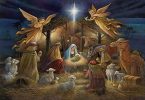Third Sunday of Ordinary Time (Year B)
Scriptures: Jon. 3:1-5, 10; Ps. 24: 4-6, 7-9; 1 Cor. 7:29-32; Mk. 1:14-20
The message of this Sunday is very clear. It invites us to repent and believe in the Gospel. Repentance comes first before faith. It is interesting to note St. John the Baptist also preached repentance. The Gospel of Mark states that John the Baptist appeared in the wilderness, preaching a baptism of repentance for the forgiveness of sins. (Mk. 1:4) Jesus also opened his mission with the call to repent. We find the first words of Jesus’ in the Gospel of Mark, “a call to repent and believe in the Gospel” (Mk. 1:14-15). St. Peter also preached repentance after receiving of the Holy Spirit. It was his first sermon. He said, “Repent and be baptized, every one of you, in the name of Jesus Christ for the forgiveness of your sins. And you will receive the gift of the Holy Spirit.” (Acts 2:38).
We can summarize from these three towering figures of the New Testament especially from the Lord’s teaching that repentance is the key to enter into heaven. Repentance comes first before our faith in God. The good news is God himself calling us to repent. He does not call to condemn us but to save us.
It is seen in the first reading. The story of Jonah is very interesting. The book was written post-exilic period. It is written in a way to correct the understanding of nationalist Jews who believed that the gentiles would perish at any cost. As a matter of fact, prophet Jonah too had the same understanding. The people of Nineveh were gentiles. The Assyrians who came from this land had annexed the northern part of Israel. The ten tribes were taken in captivity. The history tells us that these ten tribes of Israel were lost in captivity. The Jews hated them to the core. Hence, the prophet’s reluctance to go to Nineveh, preaching about repentance in ambiguous words to the people of Nineveh shows that Jonah never liked God to show mercy to the people of Nineveh. The later chapter of the book of Jonah reveals to us that God made Jonah aware of his love towards his people irrespective of any cast, creed and religion. God saw the repentant hearts of Ninevites. He showed them mercy.
Jesus used this reference of Prophet Jonah in his preaching. (Mt. 12:38-41) Jesus talks about Jonah staying in the belly of a fish for three days so also he has to stay in the belly of the earth for three days. Jesus relates the signs of Jonah to himself. (Lk. 11:30) Jesus says that Jonah became the sign to the people of Nineveh and so the Son of Man is a sign to his generation. Jesus declares that something greater than Jonah is here. The meaning of the phrase “sign of Jonah” remains obscure. However, Jesus is clearly challenging us to keep Nineveh as a model to be emulated. The greatness of the city is recognized in their repentance. We are called to imitate them by repenting over our sins.
The four disciples whom Jesus called are the second group of people in today’s liturgy who listened to Jesus’ call to repent. They were also from the Galilee. The area which was affected by the Assyrian invasion. They were representatives of the society which was immersed in the world. They were fishing, mending nets, living and working with their family members. At the call of Jesus, they left everything and just followed him. They cannot come to faith unless they had repented from their sinfulness.
The second reading also has a similar message of repentance. The Corinthians lived a very worldly life. The people had a materialistic approach. They led immoral lives. St. Paul writes to the Corinthians to repent from their sinfulness. He was convinced of it because he had attained repentance in his life on the way to Damascus. He was changed after that moment. The feast of the conversion of St. Paul is celebrated on 25th January. We are going to celebrate it on in the next week. The feast has a strong message of repentance. We are called to repent.
The call to repent has swift and instant. The readings of today’s liturgy have a direct reference to it. Jonah in the first reading told the Ninevites that there were forty days to repent. St. Paul in the second reading told the Corinthians that there was no time left for he believed in the imminent Parousia. Jesus in the Gospel tells people that the time is fulfilled and the kingdom of God is at hand. We need to recognize the urgency with which the message of repentance is given to us. We need to realize that Baptism alone will not take us to heaven but the repentant heart.






